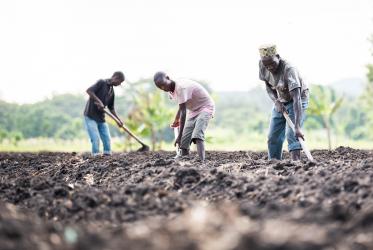Twenty-seven young people from 11 countries across Asia officially began the World Council of Churches (WCC) Eco-School in Chiang Mai, Thailand. The school will run from 4-17 November, exploring water, food, and climate justice.
Hosted by the Christian Conference of Asia, students in the WCC Eco-School will study, share experiences from their countries, visit local communities, and strategize projects for their home contexts.
WCC deputy general secretary Prof. Dr Isabel Apawo Phiri challenged the participants to become “eco ambassadors” for their region. “Issues related to water, food, health and climate change cannot be discussed in isolation as they are inter-related,” Phiri said.
Delivering the keynote address, Dr Mathews George Chunakara, general secretary of the Christian Conference of Asia, said that in order to protect the household of God and the entire creation, all religions should come forward and contribute with their spiritual resources and values.
“The capital-intensive, export-oriented, mono-culture agricultural corporations only operate with profit as their motive,” said Chunakara. “The farmers in Asia are forced to use genetically-modified seeds, imported pesticides, and chemical fertilizers.”
This leads to soil degradation, loss of indigenous seeds, bio-diversity, and concentration of lands in the hands of few, and it restricts diversity of agriculture based on food patterns that are dictated by mushrooming fast-food companies, Chunakara explained. “These unsustainable agricultural practices promoted in developing countries are affecting traditional knowledge and sustainable agricultural systems and ultimately affect food security.”
The WCC Ecumenical Water Network (EWN) in collaboration with various WCC programmes including the Ecumenical Advocacy Alliance (EAA), Economic and Ecological Justice programme, Youth Engagement in the ecumenical movement and Health and Healing programme organize the third edition of the Eco-School.
Along with the WCC and the Christian Conference of Asia, the 2019 Eco-School is also supported by the World Student Christian Federation Asia Pacific region, as well as through financial contributions from the InFaith Community Foundation through the Evangelical Lutheran Church in America.
“Only an ecologically sustainable world can ensure harmonious co-existence amidst all God’s creation” - CCA news release 6 November 2019
Learn more about WCC work on Care for Creation and Climate Justice






